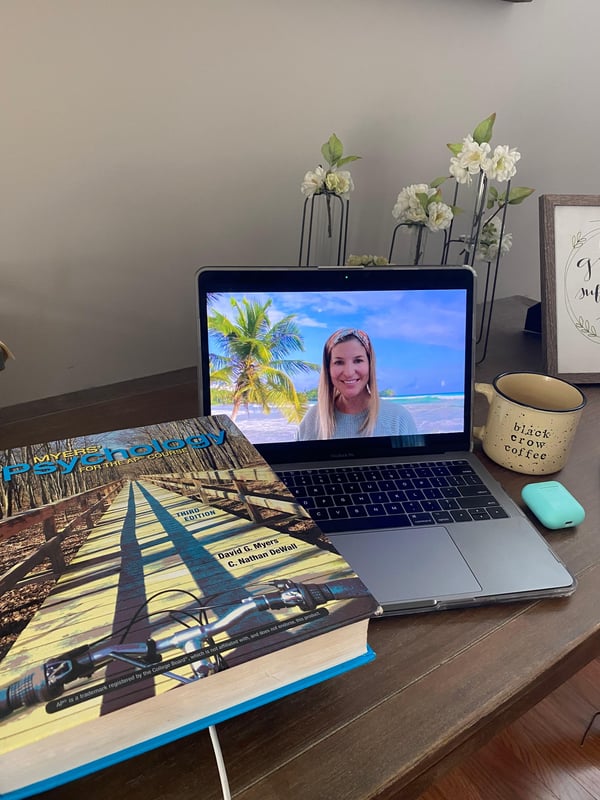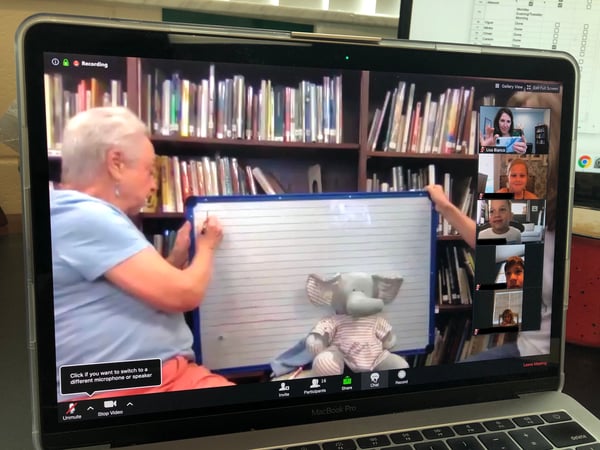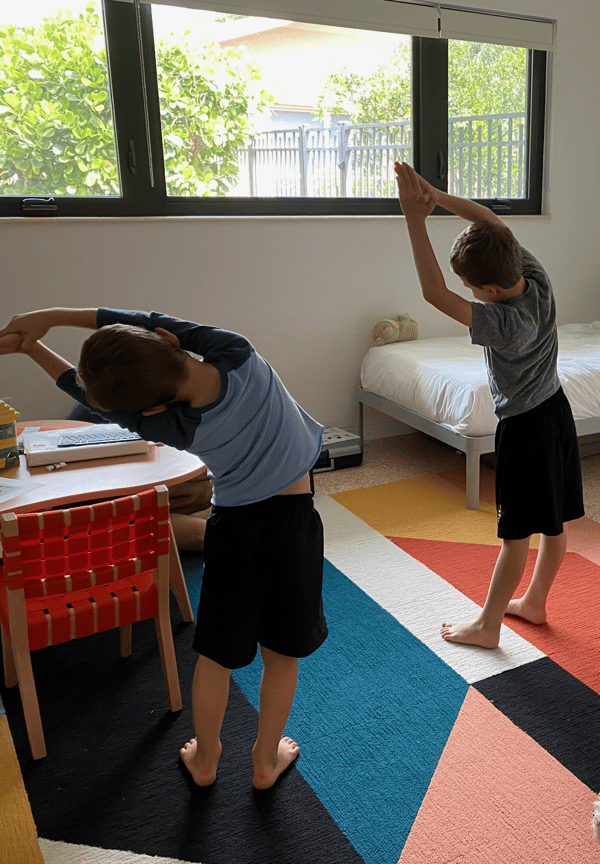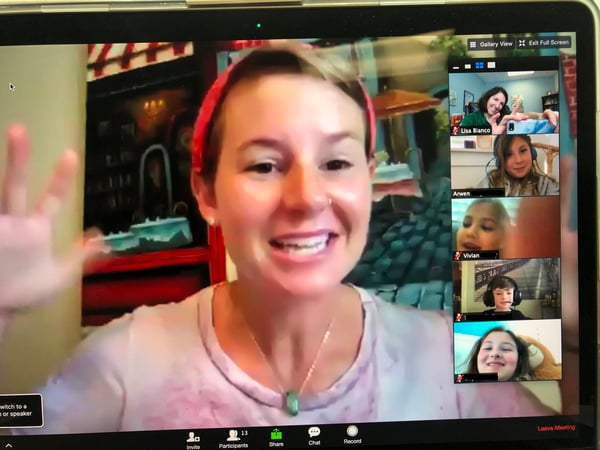A Letter to the Shorecrest Adult Community:
Our daily lives have changed in ways that might have been unimaginable even a week ago. We are all feeling a wide range of emotions as a result of the changes in our lives due to COVID-19: anxiety, sadness, anger, loss, loneliness, frustration, maybe even irritation. These emotions are, of course, very normal human reactions to such an extraordinary circumstance. Furthermore, we know that children can be very influenced by the emotional states of the adults who are caring for them. With that in mind, we can help both ourselves and our children by identifying ways to manage our stress and build resiliency during these trying times.
The field of neuroscience tells us that real and perceived threats to our safety can cause an integral part of our brain, the amygdala, to flip us into a state of fight, flight, or freeze. When stress, anxiety, or other negative emotions cause this amygdala flip, our brain shuts down its capacity for higher order thinking in order to react quickly to the present threat. In this way, high levels of stress can make it very difficult to problem solve, organize, or implement a planned solution.
Right now, we adults have quite a lot going on that could cause our amygdalas to flip, and understandably so! We are dealing with constant change and great uncertainty. We are at home, with our families, trying to work and keep them working. We are worried about loved ones who may be elderly, sick, or otherwise more vulnerable to COVID-19. Many of us are concerned about our jobs, our finances, or our access to needed resources. We have lost some of our healthiest outlets, such as socializing with friends and going to the gym. We are grieving the loss of typical rites of passage in our kids’ youth. We have no timeframe for how long this will last. It’s no wonder if we are, at times, less than our best.
We are all doing the best we can, but it is important to remember that our children are watching. We are providing them with a moment-by-moment model of how to manage unknowns and respond to crises. Our anxiety as parents can be contagious to our children, especially as we are spending more time together. However (and this is a big however!), the way we respond to this anxiety can be contagious as well. With this in mind, it is important to convey proper concern and caution, provide accurate information at an age-appropriate level, and model a healthy and positive attitude toward our circumstances. As you and your family navigate the realities of social distancing and outbreak mitigation, we encourage you to keep the following considerations in mind:
Be present. Be calm and reassuring.
Identify ways to manage your own stress and anxiety so that you’re able to keep your composure when your children are watching. There are great suggestions in the links provided for doing so. Especially with younger children, don’t feel that you need to bring up the topic but try to remain neutral and open if they have questions or concerns. Make yourself available for quiet downtime, when many kids will express their concerns and fears.
 Mrs. Ellis' AP Psychology class
Mrs. Ellis' AP Psychology class
Focus on the purpose of the social isolation and outbreak mitigation efforts.
Help children to understand that if we all stay home and do our best not to spread germs, we can help our health professionals take good care of the people who need it most, in addition to reducing the likelihood that we or our loved ones will get sick. When explaining the need for more frequent, thorough hand washing and household cleaning, emphasize that we are doing this to keep everyone healthy, not just ourselves. Try to focus on the great compassion and camaraderie humans are showing around the world in order to save lives and protect our most vulnerable. Then try to share that focus with your children. Encourage them to see this time of social distancing as a positive as well; families are able to slow down and enjoy more home-cooked meals, playtime in the backyard, and Netflix binging sessions.
Don’t judge or try to change your feelings.
Emotions that we don’t acknowledge or express tend to become more intense over time. Rather than avoid your feelings, try to notice and accept them without dwelling in them. It is very normal to feel anxious during this strange season of life. Don’t beat yourself up for that. But do know that you have some control over whether you indulge a negative feeling or try to help yourself feel better. Mindfulness practices as well as any enjoyable experiences that allow you to experience flow and engagement can be helpful in moving through negative emotions.
Give yourself, and everyone around you, a little grace.
Nobody was ready for this. Everyone is doing the best they can. We will all make mistakes and life will be messy for a little while. If we support each other through this and give each other and ourselves some permission to be imperfect, we will get through it together.
 Mrs. Minke's Kindergarten meetup
Mrs. Minke's Kindergarten meetup
Get enough news to be well informed. Then stop.
Don’t drown yourself in the news. Yes, we all need to be informed about developments. However, constantly watching updates can provoke anxiety in adults, teens, and children. When children are exposed to information above their developmental level, such as information targeting adults, they can become quite worried and confused. It’s wise to give children honest and accurate information so that they don’t imagine a situation far worse than reality, but it’s also important not to dwell on frightening images, details, or stories.
Find new rituals and routines.
When we are stressed, it is really easy to fall into distractions like constant snacking, mindless use of technology, and TV marathons. While some distraction can be welcome, these activities do not necessarily contribute to our emotional wellbeing. In excess, they can even detract from it. Within reason, try to set a basic schedule to the day in order to ensure that there is enough purposeful time for what really matters most. We can help children to find structure, purpose, and predictability in their day by sticking to consistent wake, bed, and meal times. We can help children to feel important and competent by including them in the cooking, laundry, home finances, yard work, home improvement projects, and so on. They will learn skills that they can use later in life but will also get a boost to their emotional wellbeing by making a meaningful contribution to the family. (Note: Some children and adolescents may express resistance and negative emotions when being asked to make a contribution. Stay strong, try anyway. Ask for their input so they can take some ownership over the project. They may not like the idea at first but will benefit from having a sense of contribution to the greater good).
 Lower School siblings work yoga into their day
Lower School siblings work yoga into their day
With that said, be flexible.
It is good to have a plan and goals for our days at home. However, that plan will not always come to fruition. We may not always reach those goals. The more we can be flexible and accept that disruption will happen, the less stress those inevitable disruptions will cause us. This is a season of life that is forcing many of us to slow down and be somewhat less “productive.” See this as a healthy change and try to hold your daily plans with an open palm. Sometimes, halting everything and building a living room fort out of blankets may be just what the doctor ordered.
Don’t forget to prioritize fun and taking care of yourself!
Human beings, big and small, are stressed out right now. We need to take care of ourselves, inside and out, physically and emotionally. We need to back each other up so that adults get a break to relax and recharge. We need to get in some exercise, good healthy nutrition, creative socialization, escapes into nature, good laugh breaks, and even some silliness into our day. We aren’t built to hold up under the constant stress and striving. Find your fun and make sure you prioritize it!
 Mrs. Granger greets her students via Zoom
Mrs. Granger greets her students via Zoom
Take the opportunity you’re being given.
This is an opportunity for us all to take a step back and reflect on our lives right now. What gives us the greatest joy? What causes us the most pain? Where can we change and grow when the world begins turning again? We have an unprecedented opportunity to deepen our connections with those who matter most to us, whether at home or virtually. There is time for the deep conversations, new experiences, and long moments that build relationships. We must be ever mindful of the threat in the world around us, but we are more resilient when we can reframe our situation into one that emphasizes growth and long-term outcomes. When we are on the other side of this global health emergency, how will you have grown?
Above all, remember that it is in times of stress that we develop resilience, connect with our fellow human beings, and appreciate our blessings in a new way. Many adults may have memories of times when the world seemed to stand still, when families and communities pulled together in the face of crisis. Certainly there is pain and sorrow before us and ahead of us. But we are still allowed to find joy, connection, peace, and purpose in the midst of it all. When we do so, we become stronger. We wish health, strength, and peace for every member of our Shorecrest community in these weeks that we can’t be together. There are additional supports and strategies in the links provided, including suggestions for every age and developmental level. If we can help your family in a more individual way, please don’t hesitate to reach out.
Resources:
SAMHSA Talking with Kids Infectious Outbreak.pdf
SAMHSA Coping with Stress Infectious Outbreak.pdf
With Charger pride,
| Kate Fierce | Courtney Ellis, LMHC |
| Lower and Middle School Counselor | Upper School Counselor |
| kfierce@shorecrest.org | cellis@shorecrest.org |
Courtney Ellis ‘02 - US Counselor / AP Psychology Teacher
After working in private practice as a Mental Health Counselor for 10 years, Courtney returned to her alma mater to serve as the Counselor to the 9-12th grade Shorecrest Upper School. A Class of 2002 alumna, Courtney is now teaching AP Psychology, a class she herself took as a student at Shorecrest!
Ms. Ellis received her B.S. in Family, Youth, and Community Services from the University of Florida, and her Masters in Counseling from Asbury Theological Seminary.
Courtney joined the Shorecrest faculty in 2018. During the facilities closure Courtney is continuing to teach and support students while social distancing with her 4-year-old, 2-year-old, 70 lbs dog, and husband of 12 years.
Kate Fierce - LS & MS Counselor
Kate Fierce is the school counselor in the Lower and Middle Schools at Shorecrest Preparatory School, as well as a specialist and consultant in social and emotional learning (SEL). She has been a school counselor for fifteen years, in both suburban and urban settings. From the beginning of her career, she has shared her passion for helping children develop into capable, resilient, empathetic and independent learners; Kate works with students, faculty, and families. In addition to supporting Shorecrest faculty in incorporating effective SEL strategies into their teaching, Kate provides coaching and training to faculty and schools across Florida and the country.
She received an B.A. in Psychology from Cornell University and a M.S.Ed in Psychological Services from the University of Pennsylvania.
Kate joined the Shorecrest faculty in 2012. While practicing social distancing Kate is streaming online workouts, cooking from scratch, coworking with her two cats, and missing seeing her students in person.















